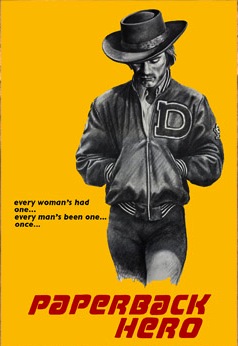Monday, May 27, 1974
PAPERBACK HERO. Written by Barry Pearson and Les Rose. Title song by Gordon Lightfoot. Music by Ron Collier. Directed by Peter Pearson. Running time: 93 minutes. Mature entertainment with the B.C. Classifier's warning: some nudity and coarse language.
A YEAR AGO [1973], Michael Spencer, executive secretary of the Canadian Film Development Corporation, was beginning to have serious misgivings about Canadians' self-image. "What we don't need," he said, "is another movie about the Great Canadian Loser."
Canada, according to its movie-makers, was carpeted with losers from sea to sea. They ranged from Newfoundland's Rowdyman (1973) to the Rainbow Boys (1972) of B.C. Spencer was depressed because, on the whole, films about failures were films destined to fail.
A happy exception to that rule is Peter Pearson's Paperback Hero, a solid, satisfying entertainment that laces its human drama with broad, Western comedy. The story of a little man with a larger-than-life self-image, it is that rare cinema beast, a movie that really is more than the sum of its individual parts.
Pearson sets it all out in a vivid, mockingly beautiful and deliberately ironic opening scene. His ground level camera catches the silhouette of a gunfighter on the horizon, set against the blue of the prairie sky,
He advances with caution, living out the ritual of the shoot-out. Crouching, he draws and squeezes off a murderous volley, smashing a row of beer bottles set out before him. As dawn breaks over the Saskatchewan plain, a pickup truck, the modern Western workhorse, is seen roaring across the screen.
First seen in the flashes of his sixgun, Rick "the Marshal" Dillon (Keir Dullea) is a man living on borrowed time, and living a borrowed dream. (Fittingly, his imaginary self, TV's Marshal Matt Dillon, is a fiction, a man with no historical existence.)
The hero of rural Delise's bush league hockey team, Dillon thinks of himself as their "big gun." When his long-suffering girlfriend, barmaid Loretta (Elizabeth Ashley), tries to talk to him about marriage, he clings to his unfettered image, telling her that if he had lived in the Old West, he would have been a gunfighter.
What he really means is that he would have been an unfortunate show-off, doomed to act out his insecurities by calling attention to himself in violent and outlandish ways. Dawn is beginning to break upon Dillon, though.
A hardware store clerk, he is playing out a tragic game. When he learns that local businessman "Big" Ed (Franz Russell) is planning to fold the rambunctious, money-losing hockey team, his dream world begins to crumble around him. The swaggering, womanizing town marshal is suddenly in danger of aging into the town fool.
Pearson, a Canadian Film Award winner six years ago for his dramatic short, The Best Damn Fiddler from Kaladar to Calabogie, handles Dillon's story with just the right mixture of irony, pathos and flat-out comedy. Among his crucial decisions was the choice of theme music.
His selection: Gordon Lightfoot's haunting If You Could Read My Mind. Lightfoot is Canada's ranking folk poet. In his songs, he has created a gritty masculine mage that is all at once cruel, attractive, self-pitying, overbearing and vulnerable.
His musical shorthand puts the character of Rick Dillon in stark perspective, adds extra dimension to Dullea's off-type performance and helps raise Pearson's film to the heights of rough-hewn rural poetry.
On his own. Pearson manages to capture the sweep of the modern West, a land that both inspires and inimidates its inhabitants. Dullea plays Dillon with sassy style, a contrast to the erotic poignance of Ashley's Loretta, a woman every bit as trapped and desperate as her man.
Rude and outgoing, Pearson has turned out a film that is as much fun as a night out in the local beer parlour. He proves that the loser's story can be a screen winner.
* * *
KEIR CANUCK: The day may be near when U.S. actor Keir Dullea will actually qualify as Canadian content. Paperback Hero, arguably the best film of his 15-picture career, is his forth domestic project.
His Canadian career started in 1964 with a starring role in the teleplay Pale Horse, Pale Rider, part of CBC television's prestigious Festival series. He followed that with a feature film, 1967's The Fox. Based on a D.H. Lawrence novella, it was shot on a farm a few miles north of Toronto. Last season, Dullea had the starring role in CTV's ambitious, single-season science-fiction series, The Starlost.
The above is a restored version of a Province review by Michael Walsh originally published in 1974 For additional information on this archived material, please visit my FAQ.
Afterword: Originally titled Last of the the Big Guns, director Pearson's film was renamed after he secured the rights to Lightfoot's song. The reference is to the second verse: If I could read your mind, love / What a tale your thoughts could tell / Just like a paperback novel / The kind the drugstores sell / When you reach the part where the heartaches come / The hero would be me / But heroes often fail / And you won't read that book again / Because the ending's just too hard to take.
As for "Keir Canuck," he later added another four Canadian stamps to his U.S. passport, crossing the line to make the features Black Christmas (1974), Welcome to Blood City (1977), Leopard in the Snow (1979), and the made-for-TV movie The Audrey Hepburn Story (2000).
